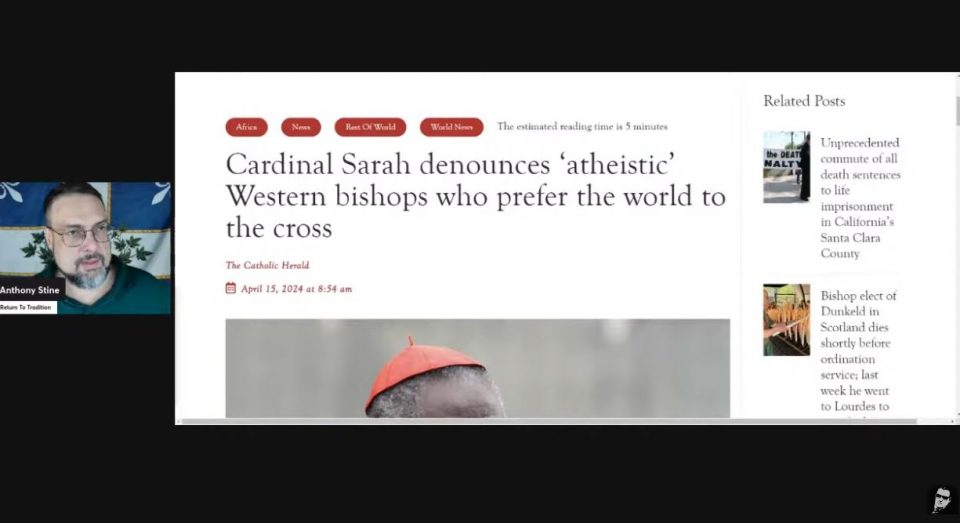Let This Lent Leave You Different, by Joseph D’Hippolito

Pew: Christianity in Europe Strongest Where It Was Banned
March 20, 2019
A Tale of Two Georges, by George Weigel
March 20, 2019
By Joseph D’Hippolito, The Stream, March 20, 2019
 Christians usually mark Lent, the most solemn season on the Christian calendar, by fasting, penitence and some form of self-denial. For instance, giving up sweets, television or social media. Lent uses Jesus Christ’s own self-denial while being tempted in the desert as a model, and stresses his suffering on the way to his death, resurrection and ascension.
Christians usually mark Lent, the most solemn season on the Christian calendar, by fasting, penitence and some form of self-denial. For instance, giving up sweets, television or social media. Lent uses Jesus Christ’s own self-denial while being tempted in the desert as a model, and stresses his suffering on the way to his death, resurrection and ascension.
Unfortunately, too many Christians just go through the motions and emerge from Lent essentially no different than before. Is there a better way?
Yes. Maybe in addition to conventional practices, Christians can use Lent to concentrate on drawing closer to God in different and unique ways.
Drawing Closer
One way would be increasing time for prayer or Bible study. After all, what’s the point of giving up television or social media during Lent and not using that time to get to know God more intimately?
Also, what’s the profit of giving up television or social media if others can’t benefit from that time? Opportunities to help others range from volunteering at various local agencies and churches to helping somebody going through a particularly rough time — somebody who may be discouraged, desperate or depressed.
Another way would be taking stock of personal attitudes and behaviors that run counter to Christian ideals. Perhaps you need to be a better listener or more patient. Maybe you need to be less self-absorbed and more empathetic. Perhaps you need to make fewer rash comments. Or you need to apologize to people you have offended. Perhaps you need to stop holding a grudge against somebody who offended you.
A Unique Idea
One of my neighbors and Facebook friends had a really unique idea for Lent. He decided to give up speaking badly about himself.
“In past years, I have given up things like ice cream, or complaining at the dinner table,” he wrote. “When I give these things up, it is for good. (I do make mistakes sometimes, and revert to old behavior. I am not perfect.) Now, ice cream was particularly difficult to give up, because I had used it to make protein shakes more fun. But I have a feeling that giving up speaking badly of myself may be one of the hardest things I will have ever tried. I’ll need God’s help for this one.”
My friend’s decision might sound strange, but it really isn’t. The Bible calls Satan “the accuser of the brethren,” and the most powerful accusations we can make are those against ourselves. Perfectionism — and the extreme guilt and extreme shame that often go with it — occupy the flip side of the coin from cockiness and arrogance. All those characteristics reflect excessive self-absorption.
Help us champion truth, freedom, limited government and human dignity.
Support The Stream »
Extreme guilt and extreme shame also block the Christian’s view of Jesus’ work on the cross. In Christian theology, Jesus’ death provided the ultimate atonement for sin. This relieved humanity of the guilt and shame that go with sin. By embracing Jesus’ sacrifice as their own, Christians begin a relationship with God as His adopted sons and daughters.
Knowing God’s Love to Overcome Temptation
God doesn’t want us to become so focused on our failures and mistakes that we don’t see His love in the midst of them. My friend expressed the concept in his own way.
“There has to be a balance between realism and potential,” he wrote. “But I have a habit of being dramatic with my words, and I end up denigrating myself. It has occurred to me that I need to treat myself as a friend, and another child of God.”
That approach can help improve relationships with other people. One of the Judeo-Christian ethic’s two great moral laws — after loving God with your whole heart, mind and strength — is loving your neighbor as yourself. In other words, how you view yourself affects how you view others. You can’t love your neighbor as yourself if you don’t love yourself as God loves you.
Appreciating the depth of God’s love for you can help you appreciate the depth of God’s love for others. As a result, helping others becomes less of a burden and more of an honest expression of God’s character and personality. Duty gives way to genuine compassion. That genuine compassion enables believers to perform the good works God prepared for them in advance, as Paul wrote in his letter to the Ephesians.
God’s love for His son, Jesus, enabled Him to overcome Satan’s temptations. Jesus’ 40 days of fasting came after His baptism, when the Holy Spirit appeared as a dove and landed on Jesus while God proclaimed, “This is my beloved son, in whom I am well pleased.” That proclamation reinforced Jesus’ sense of identity and mission, which empowered him against Satan.
Lent, ultimately, is about growth, not performance. It’s about growing to the point where Christians can live the way God wants them to live: to act justly, love mercy and walk humbly with that God, as the prophet Micah wrote.




